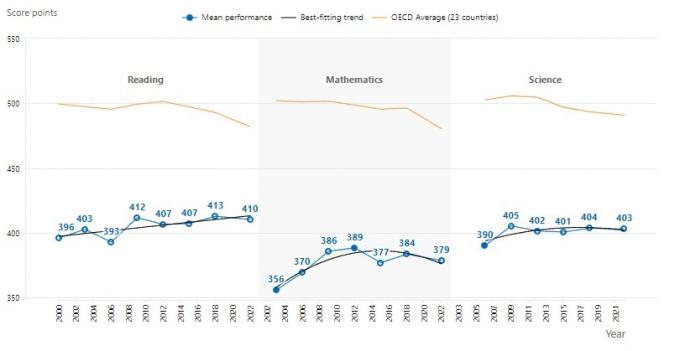A autocracy It is an authoritarian form of government in which the government is controlled by a person called an autocrat. In this type of government, the actions of the State are dictated by the interests and wishes of the autocrat, and there is no existence of what is known as a democratic rule of law.
Modern autocracies try to hide their true face behind a facade that tries to maintain the appearances of a democratic system. Among the characteristics of autocracy are the centralization of power, manipulation of the political system and the electoral system, nationalism, elitism, among others.
Read too: What can be considered a tyranny?
Topics of this article
- 1 - Summary on autocracy
- 2 - What is an autocracy?
- 3 - Characteristics of an autocracy
- 4 - Are there autocracies in the 21st century?
summary about autocracy
Autocracy is an authoritarian form of government in which power is concentrated in the hands of an individual.
The ruler within an autocracy is called an autocrat.
The term autocracy originates from the Greek language, being translated as “self-government”.
Autocracies do not have free and fair elections, since the electoral system is manipulated to serve the interests of the autocrat.
Brazilian democracy has suffered shocks in recent years and in 2019 it was even placed on a list of countries governed by autocratic leaders.
What is an autocracy?
Autocracy is understood as onethe shape of government that expresses the will of an individual — O autocrat. In autocratic regimes, the political system is subject to the interests of the holder of power, and this individual controls the whole of society, imposing his will and controlling his country, often in a violent.
One autocratic system does not have democracy, since the basic principles that form a democracy are neutralized or else act as a front. This because A democracy is marked by:
free and fair elections;
guarantee of freedom of expression for the population;
defense of the principles of the democratic rule of law;
guarantee of a free and independent media.
In autocracy, there may even be elections, but they are not free and fair, as they are manipulated to serve the interests of the autocrat. Thus, there is no rotation of power in autocracies. There is no space for political opposition and the population, therefore there is no freedom for expression of political opinion. Finally, autocratic governments use the media to manipulate information, and thus there is no independent and free media.
O The term autocracy comes from the Greek language, being a word that arose from records (translated as "self") and Kratos (translated as “power”). The combination of the two terms is translated as “government of oneself”, demonstrating the association of the term with a government exercised by a person.
Do not stop now... There's more after the publicity ;)
Features of an autocracy
When we speak of an autocracy, we are necessarily speaking of a non-democratic government, which acts deliberately to suppress the liberties of the population to secure the interests of the leader—the autocrat. Among the characteristics of an autocracy, we can highlight:
centralization of power: power is concentrated in the hands of the ruler.
personalism: the government of the nation is confused with the interests of the leader. There is an exaltation to the image of the leader.
Censorship: autocracies manipulate the press to report only news favorable to the government. Criticism of the government is filtered.
Elitism: many times, autocratic governments sustain themselves in power with the support of economic elites. Thus, these governments act to defend the interests of this elite that supports them.
Manipulation of the political system: Autocrats seek to perpetuate themselves in power by extending their terms of office or by allowing unlimited re-elections.
Electoral system manipulation: Many autocracies maintain electoral systems in place to support the idea that they are a democracy. This electoral system, however, is manipulated to ensure the interests of the leader.
Persecution of opponents: the political opposition is systematically persecuted, being intimidated into silence, leaving the country or assuming a role as a façade opposition.
Nationalism: autocrats often use an extreme nationalist discourse, which keeps the population fearful and open to conservative and authoritarian measures.
Control of the political system and social movements: social movements are repressed in an autocracy, and the political system is changed repeatedly to keep the autocrat in power. A clear example of this is the increase in members of a supreme court, for example.
Maintain an air of normalcy: modern autocracies seek to maintain a façade political and electoral system in order to keep up appearances and sustain the idea that it is still a democracy.
Read too: What are the existing forms of government?
Are there autocracies in the 21st century?
Yes, there are still autocratic governments in the 21st century. Historically, the term autocracy has been associated with authoritarian and absolute monarchies, marked by the absolute power of the monarch. Thus, governments such as the absolutist monarchy in France and tsarism in Russia were understood as autocracy.

The term, however, was first used by the Greeks and Romans. For the Byzantines, the term was used to refer to the emperor, who referred to himself as "autocrat". At the moment, several countries are understood as nations with autocratic governments. Here, we will list some of these nations:
Russia;
Hungary;
Belarus;
Türkiye;
India;
China;
Syria;
Venezuela;
Poland;
Nicaragua.
Countries like Brazil, Serbia, the United States, Ukraine, among others, were seen by political scientists as countries that have seen their democracy weaken in recent years and have been threatened by rulers potentially autocratic.
In the Brazilian case, for example, the Brazil was added, in 2019, to a list of countries that were governed by autocratic leaders. This list is drawn up annually by the Human Rights Observatory. At that time, Brazil was ruled by Jair Bolsonaro, who was considered a ruler without commitment to democracy in this report.
Image credits:
[1] Alexandros Michailidis / Shutterstock
By Daniel Neves Silva
History teacher
Would you like to reference this text in a school or academic work? Look:
SILVA, Daniel Neves. "Autocracy"; Brazil School. Available in: https://brasilescola.uol.com.br/politica/autocracia.htm. Accessed on April 26, 2023.
Click on the link and learn more about absolutism, the system of government that existed in European monarchies between the 17th and 19th centuries.
Click here to understand what democracy is, its origin, its different types and examples and how it has been put into practice in Brazil.
Learn what the Democratic Rule of Law is, when and why it was conceived, how it works and the difference between this type of State and the Rule of Law.
Click here to understand what forms of government are and how they are organized in relation to the exercise of power.
Click and see more information about totalitarian regimes. See characteristics and some details about Nazism, Fascism and Stalinism.


